|
Books Should Be Free Loyal Books Free Public Domain Audiobooks & eBook Downloads |
|
|
Books Should Be Free Loyal Books Free Public Domain Audiobooks & eBook Downloads |
|
Poetry |
|---|
|
Book type:
Sort by:
View by:
|
By: Robert Browning (1812-1889) | |
|---|---|
 Wanting is - What?
Wanting is - What?
Robert Browning was an English poet and playwright whose mastery of the dramatic monologue made him one of the foremost Victorian poets. His poems are known for their irony, characterization, dark humour, social commentary, historical settings, and challenging vocabulary and syntax. When Browning died in 1889, he was regarded as a sage and philosopher-poet who through his writing had made contributions to Victorian social and political discourse. Unusually for a poet, societies for the study of his work were founded while he was still alive. Such Browning Societies remained common in Britain and the United States until the early 20th century. | |
By: Robert Bulwer-Lytton (1831-1891) | |
|---|---|
 Last Wish
Last Wish
volunteers bring you 27 recordings of The Last Wish by Robert Bulwer-Lytton. This was the Weekly Poetry project for January 9, 2022. ----- Robert Edward Bulwer-Lytton was the son of the novelist Edward Bulwer-Lytton, and was an English statesman, Conservative politician, and poet under the pseudonym Owen Meredith. - Summary by TriciaG | |
By: Robert Burns (1759-1796) | |
|---|---|
 Will ye go to the Indies, my Mary?
Will ye go to the Indies, my Mary?
A LibriVox' Weekly Poetry tribute to Robbie Burns on the upcoming Robbie Burns Day. (January 25) Robert Burns (also known as Robbie Burns, Rabbie Burns, Scotland's favourite son, the Ploughman Poet, Robden of Solway Firth, the Bard of Ayrshire and in Scotland as The Bard) was a Scottish poet and lyricist. He is widely regarded as the national poet of Scotland and is celebrated worldwide. He is the best known of the poets who have written in the Scots language, although much of his writing is also in English and a light Scots dialect, accessible to an audience beyond Scotland... | |
By: Robert Burns Wilson (1850-1916) | |
|---|---|
 It Is in Winter That We Dream of Spring
It Is in Winter That We Dream of Spring
volunteers bring you 23 recordings of It Is in Winter That We Dream of Spring by Robert Burns Wilson. This was the Weekly Poetry project for March 10, 2019. ------ Robert Burns Wilson was an American painter and poet. Although his most famous poem was based on the battle cry "Remember the Maine," he was best known during his day as a nature poet. | |
By: Robert Burton (1577-1640) | |
|---|---|
 The Anatomy of Melancholy
The Anatomy of Melancholy
The Anatomy of Melancholy is a book by Robert Burton, first published in 1621. On its surface, the book is a medical textbook in which Burton applies his large and varied learning in the scholastic manner to the subject of melancholia (which includes what is now termed clinical depression). Though presented as a medical text, The Anatomy of Melancholy is as much a sui generis work of literature as it is a scientific or philosophical text, and Burton addresses far more than his stated subject. In... | |
By: Robert Copland (fl. 1515) | |
|---|---|
 Jyl of Breyntfords Testament
Jyl of Breyntfords Testament
Introduction - This is a collection of ten comic pieces from the 16th century and earlier, as compiled and edited by Frederick Furnivall for private circulation in 1871. Only the first is by Copland. (Introduction by Grant Hurlock) | |
By: Robert Frost (1874-1963) | |
|---|---|
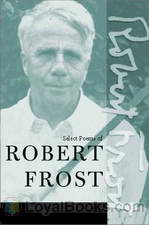 Selected Poems
Selected Poems
“Good fences make good neighbors...” If, as a reader, this is one line you do remember, then the poet Robert Frost would have fulfilled his purpose. The highest goal of a poet, he claimed, was to “lodge a few poems where they would be hard to get rid of...” Unforgettable lines and indelible memories are connected with our encounters with America's best-loved and most popular poet. His wonderful pictures of rural life and the deeply philosophical insights they offer remain with us long after many others have faded... | |
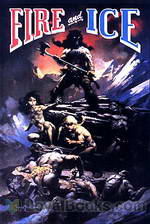 Fire and Ice
Fire and Ice
Written by one of the most significant American poets, Fire and Ice proficiently tackles the continuous query about how the world will cease to exist, whether it will go up in flames, or succumb to the cruelty of ice. First published in Harper’s Magazine in 1920 and later included in his acclaimed anthology New Hampshire, Frost effectively employs the use of simple, yet evocative language that assigns each syllable a significant purpose in the poem, while simultaneously concentrating on a perplexing topic... | |
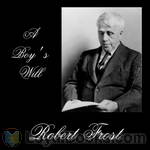 A Boy's Will
A Boy's Will
Robert Frost preferred to describe the New England countryside using everyday language. He used both as tools to explore world views and life philosophies. A Boy's Will was his first poetry anthology. | |
 Hillside Thaw
Hillside Thaw
LibriVox volunteers bring you 10 recordings of The Hillside Thaw by Robert Frost. This was the Fortnightly Poetry project for May 5th, 2013. | |
 Stopping by Woods on a Snowy Evening
Stopping by Woods on a Snowy Evening
volunteers bring you 23 recordings of Stopping by Woods on a Snowy Evening by Robert Frost. This was the Fortnightly Poetry project for January 6, 2019. ------ The meanings of this poignant poem--which entered the Public Domain in January 2019 and is being added to the Collection ASAP--range from appreciation of a simple New Hampshire snowstorm scene to reflections on death. Whose house is in the village? What promises need keeping? The poem can be interpreted on many different levels. Quoting... | |
By: Robert Jones Burdette (1844-1914) | |
|---|---|
 When My Ship Comes In
When My Ship Comes In
volunteers bring you 14 recordings of When My Ship Comes In, by Robert Jones Burdette. This was the Weekly Poetry project for June 27th, 2021. ------ Whether you interpret this as sincere, overly simplistic, or cynical is up to you! - Summary by TriciaG | |
By: Robert Louis Stevenson (1850-1894) | |
|---|---|
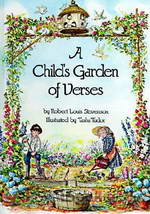 A Child's Garden of Verses
A Child's Garden of Verses
Beloved by many generations of children, A Child’s Garden of Verses is a beautiful collection of children’s poetry. Sometimes thoughtful, sometimes whimsical, but always fun. | |
 Not Yet my Soul
Not Yet my Soul
15 recordings of Not Yet my Soul by Robert Louis Stevenson. This was the Fortnightly Poetry project for May 19, 2013.Robert Louis Balfour Stevenson (13 November 1850 – 3 December 1894) was a Scottish novelist, poet, essayist, and travel writer. His most famous works are Treasure Island, Kidnapped, and Strange Case of Dr Jekyll and Mr Hyde.The following poem comes from his collection entitled Underwoods, first published in 1887. | |
 Where Go the Boats
Where Go the Boats
Where Go the Boats is a short poem by Robert Louis Stevenson. He was a Scottish author famous for writing Treasure Island. He also wrote many poems, including this one, which was published in A Child's Garden of Verses. Some comments from our readers.. "I hope my recording floats your boat." - Assaf "Help prevent toy loss, tie boat to dock after play." - Bruce "I conceive that this simple little verse is about time and writing. Of course, it may just be about little boats." - Jason | |
 My Shadow
My Shadow
Librivox volunteers bring you 14 readings of My Shadow, by Robert Louis Stevenson. Stevenson's famous poem concerns a child's shadow, and it's antics. This was the weekly poetry project for the week of September 7th, 2014. | |
 Child's Garden of Verses (Version 4)
Child's Garden of Verses (Version 4)
Robert Louis Stevenson’s A Child's Garden of Verses is one of the most popular and loved collections of children’s verse of the 19th century. This recital of all 64 poems is designed for children’s listening, especially sections 1–6. - Summary by Michael Maggs | |
By: Robert Maynard Leonard | |
|---|---|
 Poems on Travel
Poems on Travel
This volume of poetry takes the reader, or rather the listener, along on a literary tour through Europe. R.M. Leonard has collected the finest poems by some of the most celebrated poets of the English language, all covering the subject of travel, and often concerning travelling to a certain city or region in Europe. - Summary by Carolin | |
By: Robert Nichols (1893-1944) | |
|---|---|
 Ardours and Endurances
Ardours and Endurances
This is a volume of war poetry by English poet and playwright Robert Nichols. To quote Wikipedia: "On 11 November 1985, Nichols was among 16 Great War poets commemorated on a slate stone unveiled in Westminster Abbey's Poet's Corner. The inscription on the stone was written by a fellow Great War poet, Wilfred Owen. It reads: 'My subject is War, and the pity of War. The Poetry is in the pity.'" This particular volume of poetry contains his most well-known poems, and is also perhaps one of the most haunting collections of war poetry in the English language. - Summary by Carolin | |
By: Robert W. Service (1874-1958) | |
|---|---|
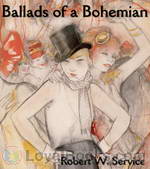 Ballads of a Bohemian
Ballads of a Bohemian
Ballads of a Bohemian is a collection of poems tied together by the narration of the “author” Stephen Poore. The poems speak of bohemian life in Paris before the war, his experiences during World War I and its aftermath. | |
 Selections from Ballads of a Cheechako
Selections from Ballads of a Cheechako
These twelve poems are from Ballads of a Cheechako which was Robert W. Service’s third book of Yukon poems, published in 1909. The word Cheechako, from Chinook Jargon, originated in the United States (Alaska) and Canada (Yukon) and was imported into local English during the Yukon gold rush that began in 1896. Cheechako, is a non derogatory word meaning “newcomer” or “tenderfoot.” The derivation looks something like this: chee new cha come ko home. | |
 Ottawa Folk Festival Robert Service Collection
Ottawa Folk Festival Robert Service Collection
The Spell of the Yukon by Robert Service with patrons, musicians and organizers. Robert Service is an iconic Canadian poet. | |
 Songs of a Sourdough
Songs of a Sourdough
Reputedly the best-selling poetry collection of the 20th century, 'Songs of a Sourdough' is best known for Robert W. Service's classic Yukon ballads, 'The Shooting of Dan McGrew' and 'The Cremation of Sam McGhee'. Service was born in Preston, Lancashire, and grew up in Scotland. In his twenties, he made his way to Canada and settled in the Yukon where he worked as a bank clerk but evidently dreamed of more adventurous pursuits. Service's readings of his poems show that he could adopt either a Scottish or North American accent. Here they are read in an accent that is not too far removed from the place of his birth. | |
By: Robert Williams Wood (1868-1955) | |
|---|---|
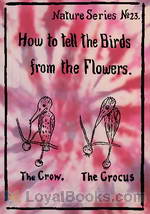 How to Tell the Birds from the Flowers
How to Tell the Birds from the Flowers
How do you tell apart a parrot from a carrot? A plover from a clover? A bay from a jay? Although there are several ways of differentiating, R. W. Wood’s use of pun and rhyme is one of the most entertaining! | |
By: Roderic Quinn (1867-1949) | |
|---|---|
 Poems
Poems
Roderic Quinn, the seventh child of Irish immigrants, was variously a teacher, public servant and newspaper editor before turning to the writing of poetry and short stories. He was particularly associated with the convivial Dawn and Dusk club which also included as members Victor J. Daley and Henry Lawson. - Summary by SonOfTheExiles | |
By: Roger Casement (1864-1916) | |
|---|---|
 Some Poems of Roger Casement
Some Poems of Roger Casement
This is a small volume of poetry by Roger Casement. Casement was a diplomat for years, active especially in Africa, where he witnessed the dark side of British Imperialism. He began to devote his life to human rights, and is still recognised for his important work particularly in the Congo and in Peru. - Summary by Carolin | |
By: Romesh C Dutt | |
|---|---|
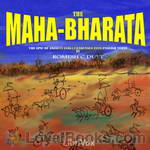 The Mahabharata by Vyasa: the epic of ancient India condensed into English verse
The Mahabharata by Vyasa: the epic of ancient India condensed into English verse
The Mahabharata is one of the two major Sanskrit epics of ancient India. Traditionally, the authorship of the Mahabharata is attributed to Vyasa. With more than 74,000 verses, Mahabharata is said to be the longest poem. Mahabharata tells the story of the epic Kurukshetra War and the fates of the cousin brothers Kauravas and the Pandavas. But more than that the Mahabharata contains much philosophical and devotional material, such as a discussion of the four "goals of life" or 'purusharthas'. The latter are enumerated as dharma (right action), artha (purpose), kama (pleasure), and moksha (liberation). (Introduction by om123) | |
By: Ronald Ross (1857-1932) | |
|---|---|
 Philosophies
Philosophies
This is a volume of poetry by Ronald Ross. It was composed in India during Ross' intensive research of malaria. Ross was first to discover how mosquitoes transmit malaria and was awarded the Nobel Prize in Medicine for this work in 1902. While this research is still well-known today, it is not very well-known that Ross also wrote poetry. This volume contains some of his poems, composed during his stay in India. - Summary by Carolin | |
By: Rosa Mulholland (1841-1921) | |
|---|---|
 Dreams and Realities
Dreams and Realities
This is a volume of poetry by Rosa Muholland. The poetry in this volume is varied, some read like fairy tales, some have a slightly sinister aspect. All poems share the very skillful execution of the verses, and the beauty of the images they evoke. - Summary by Carolin | |
By: Rosanna Eleanor Leprohon (1829-1879) | |
|---|---|
 Afternoon in July
Afternoon in July
LibriVox volunteers bring you 14 recordings of An Afternoon in July by Rosanna Eleanor Leprohon. This was the Fortnightly Poetry project for July 7, 2013.Rosanna Eleanor Leprohon, born Rosanna Eleanor Mullins, was a Canadian writer and poet. She was "one of the first English-Canadian writers to depict French Canada in a way that earned the praise of, and resulted in her novels being read by, both anglophone and francophone Canadians."Leprohon's novels were popular in both English and French Canada in the late 19th-century, and were still being reprinted in French in the mid-1920s... | |
By: Royal Baking Powder Company | |
|---|---|
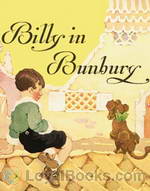 Billy in Bunbury
Billy in Bunbury
This 1924 poem/recipe book, designed as promotional material for the Royal Baking Powder Company, is set in the Oz community of Bunbury. Little Billy, who won’t eat, is taken to the delicious kingdom Bunbury by King Hun Bun to help whet his appetite. Meanwhile, the King leaves the boy’s mother with a recipe book for treats, made easy by the use of Price’s Baking Powder. Written by Ruth Plumly Thompson, though neither her name, nor the illustrator’s (Gertrude Kay) appears on the book. | |
By: Rudyard Kipling (1865-1936) | |
|---|---|
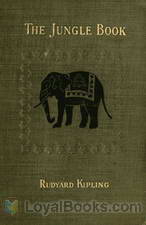 The Jungle Book
The Jungle Book
Originally written for his young daughter Josephine, who died tragically aged six, The Jungle Book by Rudyard Kipling is a collection of short stories which were published separately in magazines before being compiled into a book. The stories are in the form of fables, where animals communicate and speak to each other as humans do and the purpose of each story was to convey a moral or message to the reader. Modern readers would be more familiar with the Disney animated version in which Mowgli the little “man-cub” is raised by wolves... | |